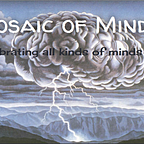What I’ve Been Up to Recently
In case you missed the announcement, the Mosaic of Minds blog has officially moved to Substack, which means new posts are published there.
So, if you’re not on Substack (yet), here’s what you may have missed:
Paywalls Begone! How to Get Almost Any Research Article Free: 4 ways to find free copies of any academic journal article.
How ChatGPT and Generative AI Will Affect Research With Humans: Science and medical researchers face privacy and consent issues.
Stay tuned for researchers to become aware of how companies use people’s information without consent, and change the consent process, and perhaps the data management process, accordingly.
The Top 2 Ways Expertise Changes How You See: When you learn a lot about something, you look at it differently.
This one summarizes lessons learned, and questions raised, from my masters thesis research on perceptual expertise.
Five Reasons Why Real-Life Memory Difficulties Don’t Always Show Up on Memory Tests: Real life makes recall hard in ways psychological tests in controlled environments don’t.
Elsewhere on the Web
I also write for Kind Theory, a wonderful non-profit organization that works to make the world a kinder, more accepting place for neurodivergent people. Some highlights:
To Accept Neurodivergence, Cultivate Compassion for Yourself and Others
Why People With ADHD Write Such Long Posts (and Also Have Trouble Reading Them)
A whole series on why neurodivergent people are constantly misunderstood, and what we can do about it, which starts here.
Last, but very much not least: How Neurodiverse Communities Changed My Life (And Might Improve Yours, Too!)
Enjoy.
